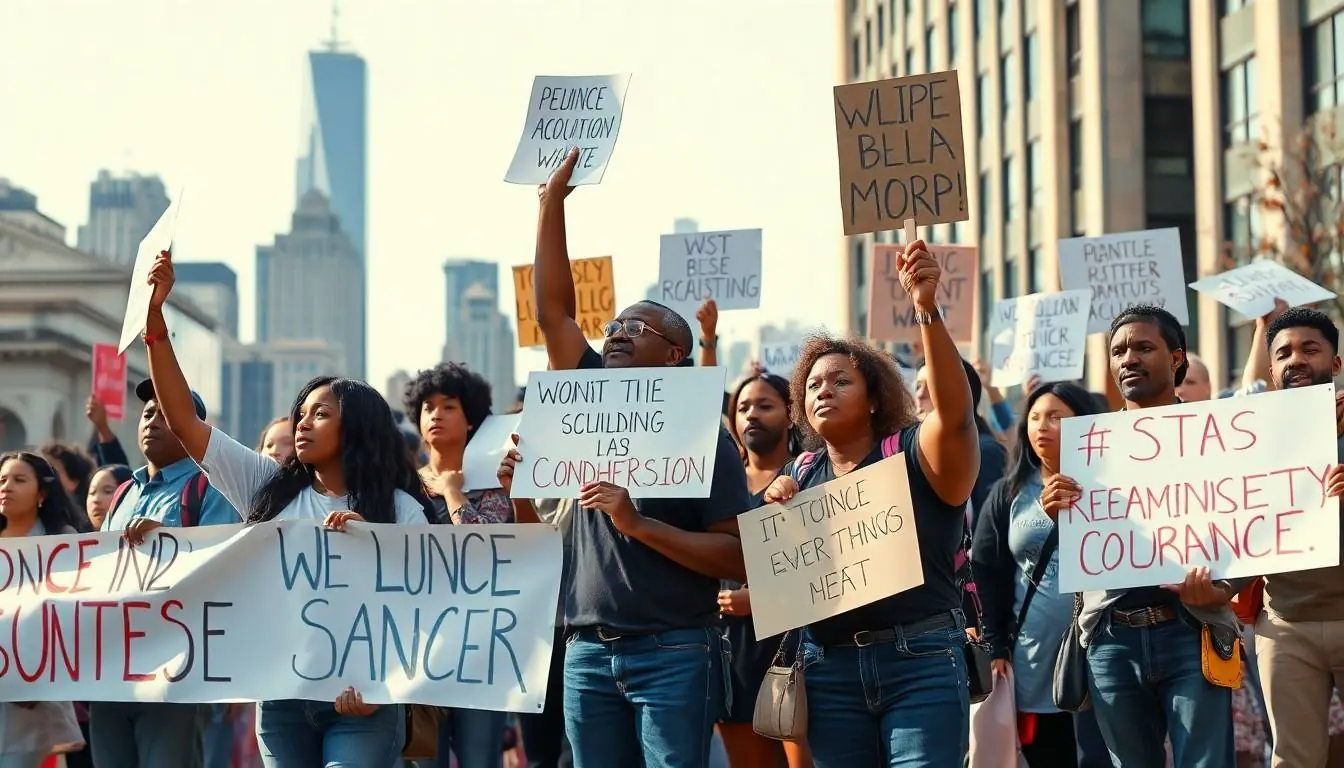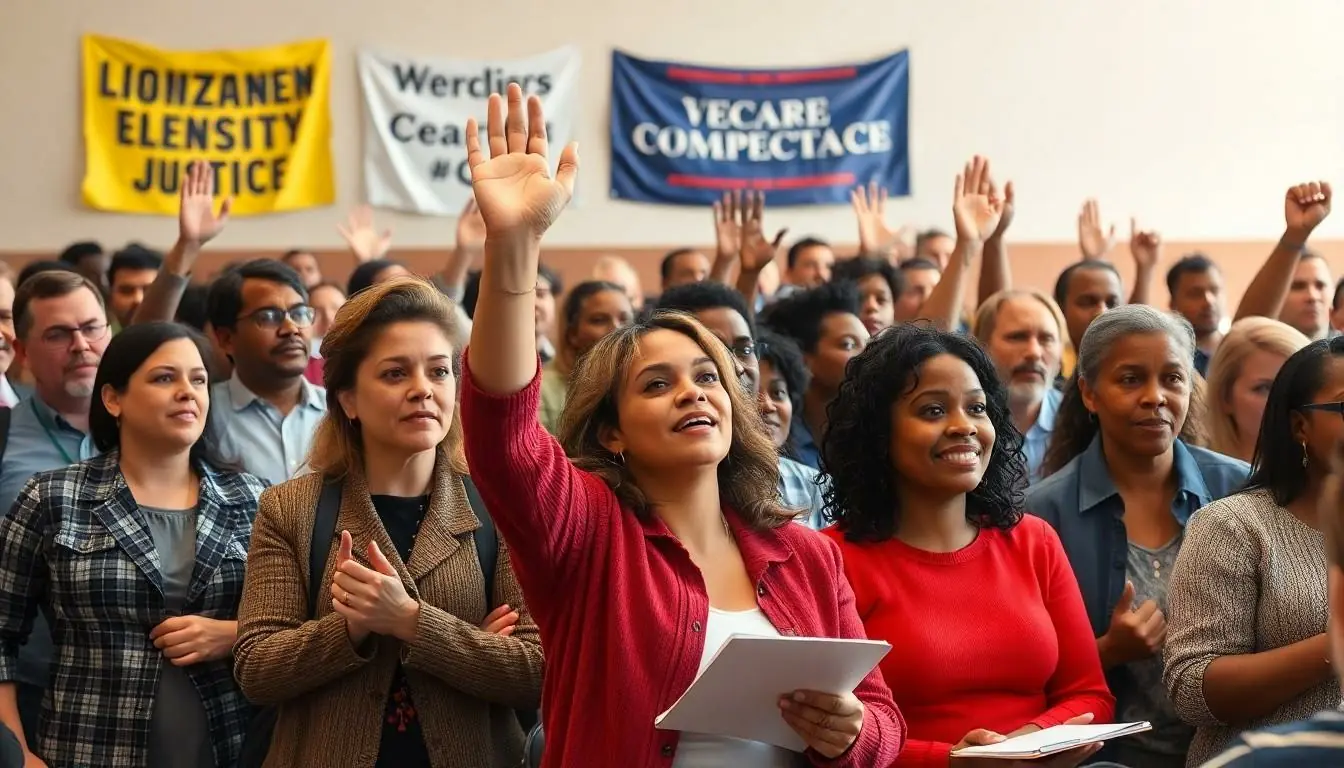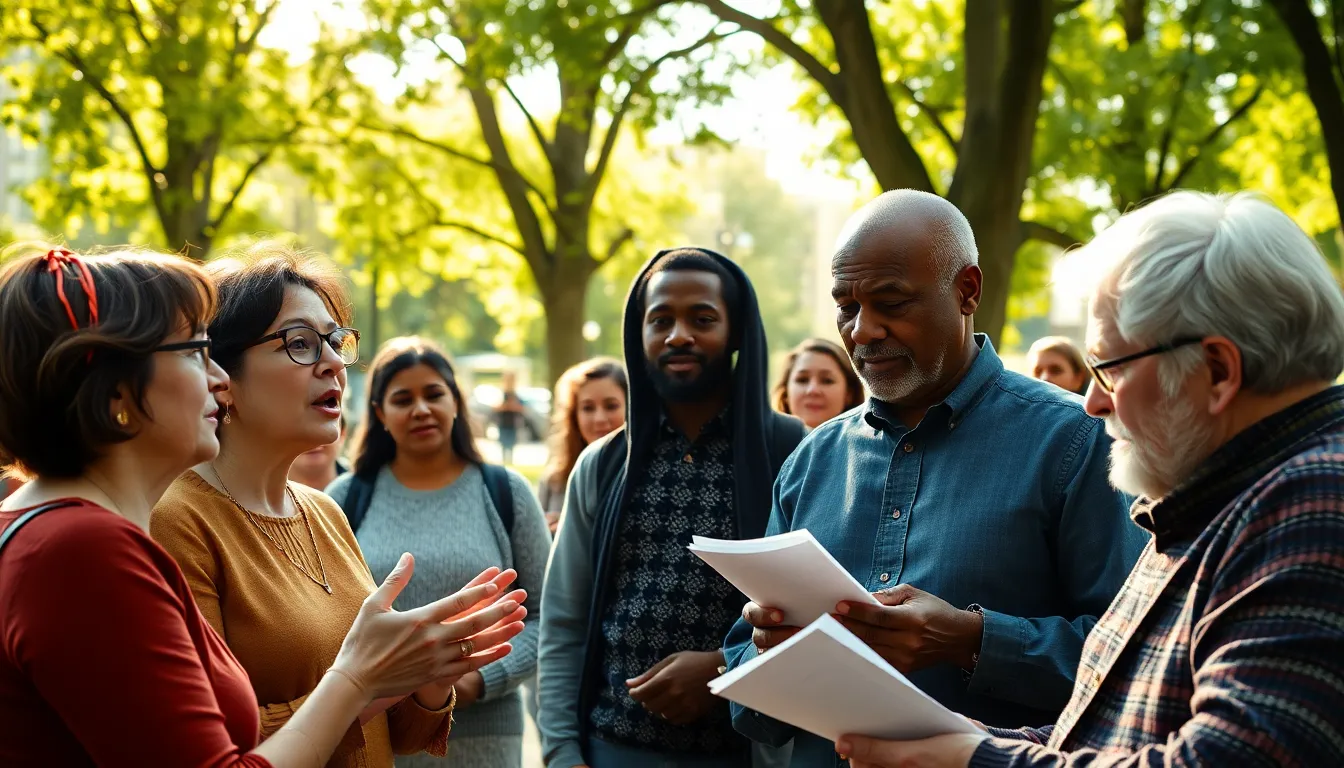In a world where change often feels as elusive as a unicorn in a fog, citizen participation emerges as a powerful force for political and social transformation. Imagine a lively town hall meeting where voices rise like a choir—each note contributing to a symphony of progress. When everyday folks take the reins, they don’t just sit back and watch the drama unfold; they become the stars of their own political show, shaping policies and challenging the status quo.
Engaging in civic activities isn’t just a hobby for the bored; it’s a crucial ingredient in the recipe for a thriving democracy. From grassroots movements to online campaigns, citizen involvement sparks conversations and ignites action. So buckle up, as we dive into the fascinating world of citizen participation and uncover how it can turn the tide in the quest for meaningful change.
Table of Contents
ToggleUnderstanding Citizen Participation
Citizen participation plays a crucial role in shaping political and social landscapes. Engaging in civic activities enables individuals to express their opinions and influence decisions impacting their communities.
Definition and Importance
Citizen participation refers to the active involvement of individuals in democratic processes. It encompasses various actions, such as voting, attending town hall meetings, and volunteering for social causes. This engagement fosters a sense of ownership among citizens regarding local governance. Active citizens often inspire change by advocating for policies that reflect community needs, thus contributing to a healthier democracy. Ultimately, fostering participation leads to more informed decision-making and enhanced accountability in political systems.
Types of Citizen Participation
Citizen participation takes various forms, each contributing uniquely to political and social change. Voting stands out as a primary mechanism, allowing citizens to choose representatives and influence policy direction. Public forums serve as platforms for dialogue, enabling community members to voice concerns and propose solutions. Grassroots movements also play a significant role, mobilizing collective action around specific issues. Volunteering in local organizations promotes community development through direct action. Each form empowers citizens and strengthens democratic processes.
Historical Context

Citizen participation has a rich history, playing a crucial role in shaping political and social landscapes.
Pre-20th Century Examples
The American Revolution exemplifies early citizen engagement. Individuals rallied together to challenge British rule, demonstrating the power of collective action. Another significant instance occurred during the suffrage movement, where women organized protests and petitions to demand voting rights. Their efforts culminated in the 19th Amendment, securing voting rights for women in 1920. These historical events showcase how grassroots organizing and civic engagement can lead to transformative political change.
Modern Developments
In recent decades, the rise of technology has revolutionized citizen participation. Social media platforms empower individuals to mobilize quickly and amplify their voices. Movements like Black Lives Matter illustrate how digital activism can engage a wider audience and effect policy change. Additionally, community organizing has gained momentum, utilizing training and resources to foster local leadership. As citizens increasingly harness these tools, their capacity to influence political discourse and social change grows significantly.
Case Studies of Successful Citizen Participation
Effective citizen participation often leads to significant political and social transformations. Examining grassroots movements and digital activism reveals how communities engage and create change.
Grassroots Movements
Grassroots movements exemplify organic citizen engagement. Small groups often initiate social change by rallying community members around common goals. For instance, the environmental movement in the 1970s mobilized thousands to advocate for laws that protect natural resources. This collective action fostered a culture of sustainability and led to the establishment of Earth Day. Activists connected on local issues, and these efforts influenced national policies. The impact of grassroots initiatives extends globally, exemplified by movements like the Women’s March, which united diverse populations to advocate for women’s rights. Participation in these movements strengthens community bonds, inspiring individuals to take action and voice concerns.
Digital Activism
Digital activism emerges as a powerful tool for social change. Online platforms enable activists to reach wider audiences, facilitating discussions and mobilizing support. The #MeToo movement highlights successful digital engagement, where survivors shared stories, prompting global conversations about sexual harassment and assault. Social media accelerated awareness, creating immediate pressure on institutions to address these issues. Similarly, campaigns like Ice Bucket Challenge utilized viral trends to raise funds and awareness for ALS research. Online petitions and hashtags amplify voices and foster participation, influencing decision-makers and generating tangible results. The impact of digital activism reshapes political landscapes, enhancing citizen influence in real-time.
Challenges and Limitations
Citizen participation faces several significant challenges. Barriers to participation often stem from socioeconomic status, education levels, and access to resources. Individuals in marginalized communities may encounter obstacles that hinder their ability to engage in civic activities. Limited awareness of political processes can also deter involvement. A lack of time and competing demands on busy schedules can further reduce participation rates.
The potential for manipulation creates significant concerns as well. Organizations with vested interests might exploit citizen movements to serve their agendas. Misinformation and disinformation campaigns can mislead participants, distorting public perception and undermining genuine efforts for change. Individuals may get swayed by rhetoric that does not represent their interests. Ultimately, these factors challenge the integrity and effectiveness of citizen participation in driving political and social change.
The Role of Technology
Technology plays a crucial role in enhancing citizen participation, making it easier for individuals to engage in political and social change. Both social media and online platforms serve as powerful tools for mobilizing communities and raising awareness.
Social Media and Mobilization
Social media platforms facilitate rapid communication and connection among citizens. Movements like Black Lives Matter gained traction through Twitter and Instagram, where users shared experiences and organized events. Activists leverage these platforms to reach broader audiences, encouraging participation and fostering solidarity. By sharing stories, images, and live videos, individuals inspire collective action and promote discussions around social issues. Furthermore, hashtags create viral trends, amplifying messages and attracting media attention. The real-time nature of social media enables swift responses to unfolding events, enhancing the potential for grassroots mobilization and political engagement.
Online Petitions and Campaigns
Online petitions empower citizens to voice their concerns and advocate for change efficiently. Platforms such as Change.org and iPetitions allow individuals to create campaigns that resonate with collective interests. Users can gather signatures and share petitions effortlessly, reaching global audiences and garnering support. These campaigns often mobilize people around issues like climate action, human rights, or legislative changes. Engaging with petitions fosters a sense of community and shared purpose while holding decision-makers accountable. Additionally, successful petitions often lead to tangible outcomes, demonstrating the power of collective citizen action in influencing political landscapes.
Citizen participation plays a vital role in shaping political and social change. Through active engagement individuals not only influence decision-making but also create a sense of community ownership. This involvement fosters a more vibrant democracy where diverse voices contribute to the discourse.
As technology continues to evolve it enhances the ability of citizens to mobilize and advocate for their causes. The rise of digital activism has transformed how movements gain momentum and reach wider audiences. Despite challenges like socioeconomic barriers and misinformation the power of collective action remains a driving force for change.
Ultimately the impact of citizen participation is profound. It empowers individuals to challenge the status quo and demand accountability from their leaders, paving the way for a more just and equitable society.



